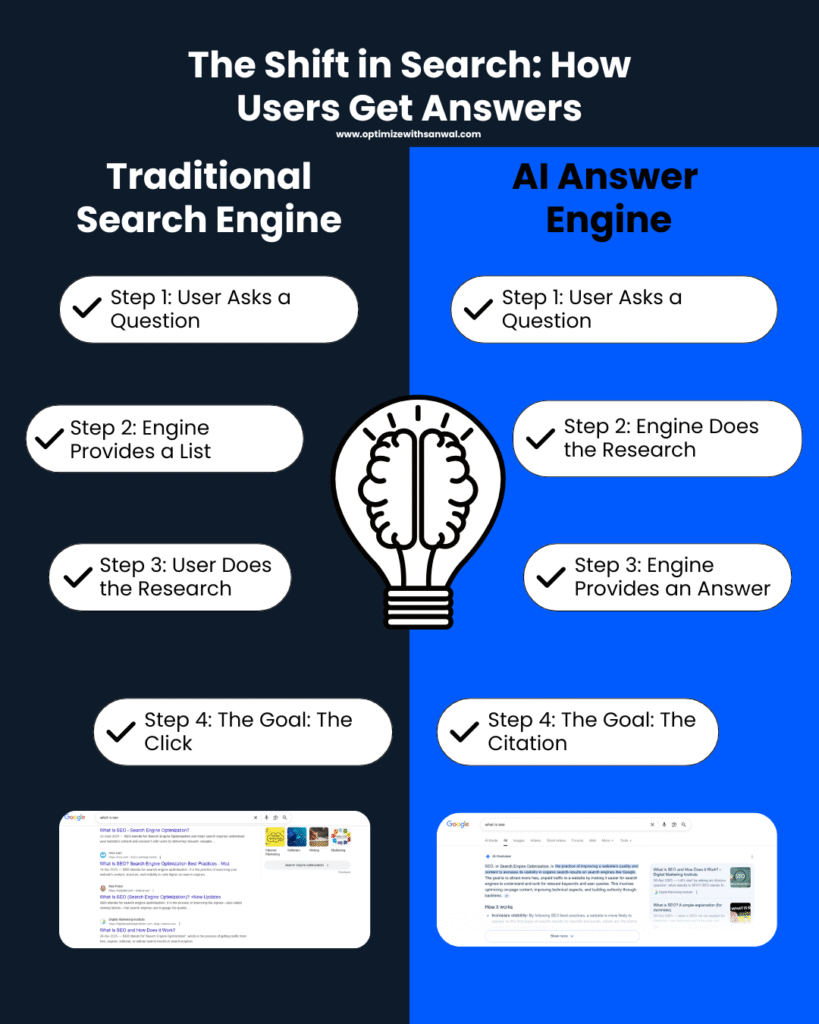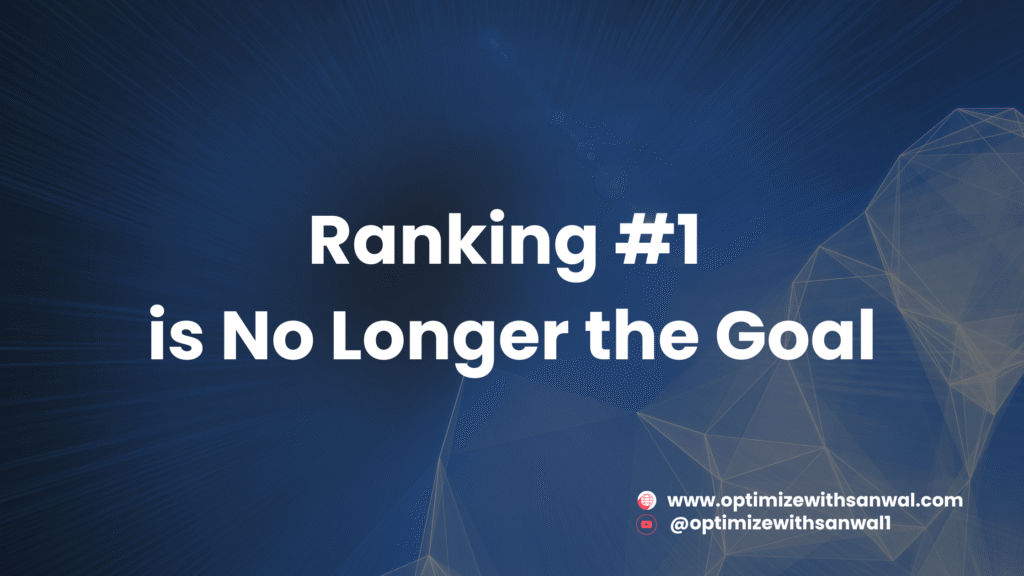For more than five years, my job as an SEO strategist has revolved around a simple goal: get to the top of a list of ten blue links. We all learned the game. But that game is ending. The familiar page of links is being replaced by a single, AI-generated answer. And if your strategy is still just about ranking number one, you are preparing for a future that no longer exists.
This shift from a list of choices to a definitive answer is the most significant change I have seen in my career. AI search engines like Google’s Search Generative Experience (SGE) and platforms like Perplexity AI are not just a new feature. They are a fundamental re-imagining of how we find information. This is not about the future of search; it is the present. Understanding how to adapt is no longer optional.
What Exactly Are AI Search Engines?
AI search engines are platforms that use large language models (LLMs) to provide direct, synthesized answers to user queries. Instead of just pointing you to websites where the answer might be, they consume information from those sites and construct a single, comprehensive response, often with citations.
Think of it this way:
- Traditional Search: A librarian who gives you a list of books where you might find your answer.
- AI Search: A librarian who reads all the books for you and then gives you a direct, summarized answer based on what they learned.
This changes everything, from user expectation to the very value of a click. Users are being trained to expect immediate answers, not a list of homework assignments.

How Does Google’s SGE Change the SEO Landscape?
Google’s Search Generative Experience, or SGE, is the most immediate and impactful change for every SEO professional. When a user searches, Google’s AI often generates a detailed AI Overview at the very top of the page, pushing the traditional blue links further down.
I have seen firsthand how this impacts traffic. A top ranking no longer guarantees visibility. Instead, the new goal is to become a trusted source for the AI itself. Your content needs to be so clear, authoritative, and well-structured that Google’s AI chooses to cite you within its overview.
This means a shift in focus from just keywords to concepts and entities. We must move beyond simply matching a search term and toward providing the definitive, multi-faceted answer to the user’s core problem.
Are New Players Like Perplexity a Real Threat?
While Google SGE integrates AI into a familiar system, platforms like Perplexity AI represent a complete departure. They are built from the ground up as answer engines.
I use Perplexity in my own workflows. It excels at research because its main purpose is to synthesize information and provide cited answers. It does not prioritize websites; it prioritizes information. The SEO strategy for a platform like this is not about traditional ranking factors. It is about becoming an indispensable, authoritative source in your niche. If your data, your insights, and your analysis are the best, answer engines will find and reference you.
Here is a simple breakdown of the strategic differences:
| Factor | Traditional Google | AI Search (SGE, Perplexity) |
| User Goal | Find the best website. | Get the best answer. |
| SEO Goal | Rank #1. | Become a cited source in the answer. |
| Content Focus | Keyword optimization. | Answering questions comprehensively. |
| Metric of Success | Organic Traffic, CTR. | Brand mentions, citations, visibility. |
How Do I Future-Proof My SEO Strategy for AI Search?
The fear of a zero-click future is valid, but paralysis is not a strategy. The work of future-proofing your SEO starts now, and it is grounded in building real authority, not just chasing algorithm changes.
- Focus on Factual Accuracy and E-E-A-T: AI models need to trust your content. Every claim must be accurate and supported. Your Expertise, Experience, Authoritativeness, and Trustworthiness (E-E-A-T) are no longer just guidelines; they are technical requirements for being included in an AI-generated answer.
- Structure Content for Extraction: Use clear, question-based headings. Use lists, tables, and concise definitions. Make your content easy for a machine to parse and understand. The AI is looking for definitive snippets to extract. Give them what they are looking for.
- Build a Recognizable Brand: In a world where direct clicks decline, brand recall becomes a primary KPI. If an AI gives an unsourced answer, will users search for your brand directly to get a trusted perspective? This is the new goal. Your content should have a distinct voice and perspective that makes people seek you out.
- Capture First-Party Data: Your email list and owned audience are your most valuable assets. If on-SERP answers reduce your traffic, having a direct line to your audience is the ultimate defense. Use your content to drive newsletter sign-ups, not just to get a click.
The era of AI search is not about abandoning SEO. It is about its evolution. It demands that we become better marketers, better writers, and true experts in our fields. The future of search belongs to those who provide real answers, not just those who are best at ranking links.
Frequently Asked Questions (FAQs)
Will SEO still be relevant with AI search engines?
Yes, but the role is shifting. SEO is moving from a focus on ranking links to a focus on influencing AI models. It’s about becoming a cited, authoritative source and building a brand that users seek out directly.
What is the single most important change for SGE optimization?
The most important change is structuring your content to directly and comprehensively answer questions. Use clear headings, lists, and data to make your content easy for the AI to parse, understand, and cite.
Can I rank in both the AI Overview and the traditional blue links?
Yes, it is possible. Often, the sites Google’s AI cites in its SGE overview are also the ones that rank highly in the traditional results. Strong, authoritative content serves both purposes.
How do I measure success in a world with fewer clicks?
Success metrics will need to evolve. Instead of just focusing on organic traffic, you will need to track things like brand visibility, the number of times your site is cited in AI Overviews, and direct brand-related searches.
Should I change my entire content strategy today?
You should start adapting it today. Do not delete your old content. Instead, start creating new content with AI search in mind and begin updating your most important existing pages to be more structured, factual, and comprehensive.
This guide covers the core strategic shift. To master it, you will want to dive deeper into each part of the process.
- Optimizing for SGE: A deep dive into adapting your content strategy for the biggest change in Google in 20 years.
- Getting Featured in AI Answers: Learn the tactics and content structures needed to have your site cited by AI.
- Answer Engines: An analysis of new players like Perplexity and what their rise means for traditional SEO.
- Zero-Click Searches: A survival guide with strategies for capturing value even when you do not get the click.
- Conversational Search: A look at how content needs to be written differently to match how people talk to AI.
Disclaimer
All information published on Optimize With Sanwal is provided for general guidance only. Users must obtain every SEO tool, AI tool, or related subscription directly from the official provider’s website. Pricing, regional charges, and subscription variations are determined solely by the respective companies, and Optimize With Sanwal holds no liability for any discrepancies, losses, billing issues, or service-related problems. We do not control or influence pricing in any country. Users are fully responsible for verifying all details from the original source before completing any purchase.
About the Author
I’m Sanwal Zia, an SEO strategist with more than six years of experience helping businesses grow through smart and practical search strategies. I created Optimize With Sanwal to share honest insights, tool breakdowns, and real guidance for anyone looking to improve their digital presence. You can connect with me on YouTube, LinkedIn , Facebook, Instagram , or visit my website to explore more of my work.


